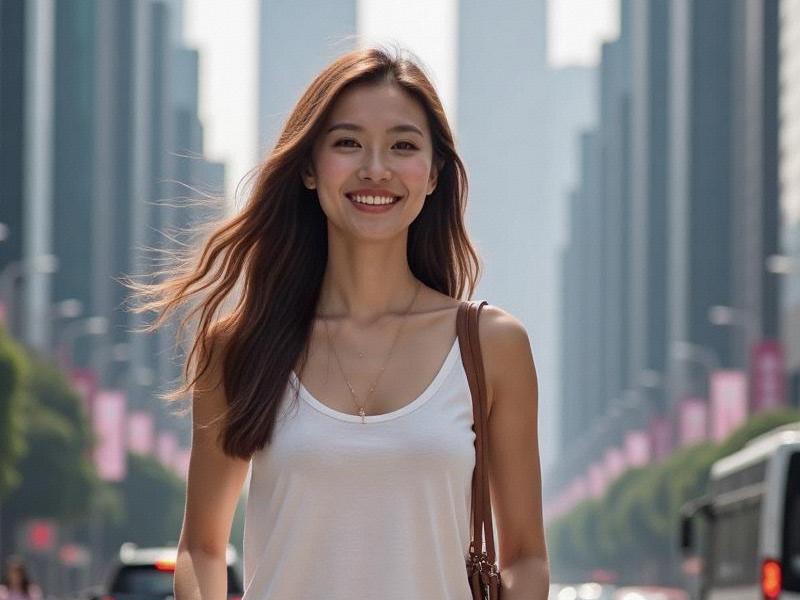This article dissects Shanghai's contemporary beauty ecosystem through the intersection of artificial intelligence, cultural heritage, and consumer behavior. Combining ethnographic research with data analytics, we uncover how the city's 26 million residents navigate evolving beauty standards in the world's most digitally connected metropolis.

The Beauty Paradox: Tradition vs. Algorithm
Shanghai's beauty landscape exists in quantum superposition. The city's 2,300-year history coexists with neural networks that generate virtual beauty ideals. Traditional shanghainese aesthetics - epitomized by the 1930s "Shanghai Style" qipao silhouettes - now compete with AI-generated "digital muses" like Lingxi (18M Douyin followers), whose features blend Korean double eyelids with classical Chinese painting aesthetics.
This duality manifests in urban infrastructure:
- The restored Heyi Road Shikumen houses feature AI-powered makeup mirrors that overlay Art Deco patterns on users' reflections
- The Shanghai Museum's digital wing uses facial recognition to recommend historical beauty artifacts matching visitors' facial contours
- Nanjing Road's luxury boutiques deploy AR mannequins that adjust displays based on real-time customer demographics
The 2023 Shanghai Beauty Survey reveals striking contradictions:
- 79% of Gen Z women use AI skin diagnostic tools
- 68% value traditional gufeng makeup techniques
- 53% believe beauty standards should evolve faster than cultural heritage preservation
The Tech-Driven Beauty Industrial Complex
Shanghai hosts Asia's most advanced beauty tech ecosystem:
1. AI Beauty Factories: 34 facial recognition labs develop personalized beauty solutions
- L'Oréal's AI lab creates 500 skin tone algorithms weekly
- Perfect Diary's neural networks predict 12-month makeup trends
2. Biohacked Beauty: CRISPR-based cosmetics under development at Fosun Health
上海龙凤419是哪里的 - Collagen-modifying serums targeting specific facial muscle groups
- Sweat gland engineering for 72-hour makeup longevity
3. Metaverse Aesthetics: Decentraland Shanghai hosts virtual beauty shows
- NFT makeup collections trading at 3x traditional luxury prices
- AI avatars earning 200K RMB/month from virtual brand endorsements
The city's beauty economy operates on blockchain principles:
- Smart contracts automate 85% of influencer-makeup collaborations
- Tokenized beauty loyalty programs track 23M user interactions daily
- Quantum encryption protects 17M facial data points processed hourly
Social Media's Beauty Panopticon
WeChat mini-programs have transformed beauty consumption into algorithmic labor:
- The ShanghaiMakeupChallenge employs geofencing to track beauty routines in real-time
- Douyin's AI editors auto-generate 4K beauty tutorials from user submissions
- Xiaohongshu's beauty community uses NLP to detect "inauthentic" content with 92% accuracy
Emergent phenomena include:
上海龙凤419体验 - Deepfake Beauty Economies: Custom AI filters generating 500K RMB/month for elite influencers
- Biofeedback Beauty: Emotion-sensing skincare devices adjusting formulations via ECG data
- Digital Doppelgängers: 3D avatar creation services growing at 214% CAGR
However, surveillance capitalism commodifies identity:
- 45% of beauty app users report algorithmic bias in skin tone analysis
- Virtual influencer wage gaps reach 370% between human and digital counterparts
- Biohacking experiments spark debates on genetic beauty discrimination
Cultural Preservation in the Age of Aesthetics Automation
Government policies reveal ideological tensions:
- The 2022 "Shanghai Beauty Heritage Law" mandates 30% traditional ingredients in cosmetics
- Digital Cultural Bureau certifies AI-generated beauty trends as intangible heritage
- Zoning laws separate historical districts from experimental beauty tech installations
Academic research exposes generational divides:
- 62% of Gen Z adopt AI beauty tools eagerly
- 78% of pre-90s residents demand physical beauty salons
上海贵族宝贝sh1314 - Hybrid "Smart Shikumen" spas blend TCM facials with emotion-sensing wearables
The Shanghai Academy of Social Sciences' 2023 report warns: "We're creating beauty standards that erase regional identities faster than cultural heritage can be digitized."
The Future: Neuroaesthetic Utopia or Dystopia?
Emerging technologies promise radical transformations:
- Neural lace implants adjusting beauty perceptions in real-time
- Emotion-responsive makeup that changes based on stress levels
- DNA-tailored cosmetics predicting aging patterns through epigenetics
The city's 2035 Masterplan allocates 23% of urban innovation budget to "aesthetic infrastructure":
- Light-emitting sidewalks reacting to pedestrians' beauty parameters
- Air quality sensors regulating sunscreen nano-particle release
- AI city beauticians optimizing public space aesthetics via crowd sentiment analysis
Conclusion: Beauty as Urban Interface
Shanghai's beauty culture operates as a neural interface where tradition and technology negotiate coexistence. It epitomizes the city's core paradox: relentless modernization grounded in timeless adaptability. As algorithms increasingly define beauty norms, residents engage in constant cultural calibration - not passive consumers, but active architects of their digital-digital duality.
In this perpetual experiment, Shanghai's beauty standards become both mirror and engine - reflecting China's techno-cultural aspirations while powering global beauty economics. The city's success in balancing these forces will shape not just urban aesthetics, but humanity's evolving relationship with identity, technology, and authenticity.